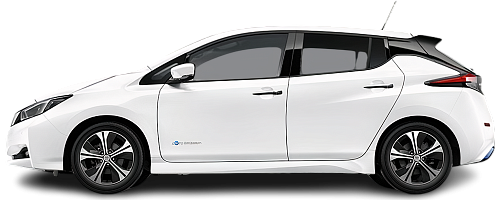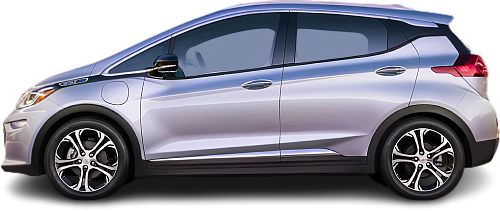Global EV Comparison: Nissan Leaf 40 kWh vs Chevrolet Bolt EV Gen 1
Struggling to Decide? Let AI Help!
Your AI Summary Is Ready!
General Info
Since both vehicles have been discontinued, they are now only available on the used car market. You can get the Nissan Leaf 40 kWh (2017-2022) for as low as €9999, while the Chevrolet Bolt EV Gen 1 (2017-2019) was never offered for sale in Europe.
The two vehicles share the same body style: Hatchback.
| Property | Nissan Leaf 40 kWh | Chevrolet Bolt EV Gen 1 |
|---|---|---|
| Years of Production | 2017-2022 | 2017-2019 |
| Current Status | Discontinued | Discontinued |
| Country of Manufacture | Japan, UK, USA | USA |
| Body Style | Hatchback | Hatchback |
| Market Availability | EU, USA | USA |
| Price Europe (Used) | €9999 | - Price Europe (Used) |
| GCC Score | 4.8 | 5.1 |
Range and Efficiency
The Chevrolet Bolt EV Gen 1 (2017-2019) boasts a greater real-world range, a larger battery, and superior energy efficiency compared to the Nissan Leaf 40 kWh (2017-2022).
| Property | Nissan Leaf 40 kWh | Chevrolet Bolt EV Gen 1 |
|---|---|---|
| Range (EPA) | 240 km | 383 km |
| Range (WLTP) | 270 km | - Range (WLTP) |
| Range (GCC) | 240 km | 364 km |
| Battery Capacity (Nominal) | 40 kWh | 60 kWh |
| Battery Capacity (Usable) | 39 kWh | 57 kWh |
| Efficiency per 100 km | 16.3 kWh/100 km | 15.7 kWh/100 km |
| Efficiency per kWh | 6.15 km/kWh | 6.39 km/kWh |
| Range and Efficiency Score | 5.6 | 7 |
Charging
Both vehicles utilize a standard 400-volt architecture.
Both vehicles support DC fast charging with a maximum power of 50 kW.
The Chevrolet Bolt EV Gen 1 (2017-2019) features a more powerful on-board charger, supporting a maximum AC charging power of 7.2 kW, whereas the Nissan Leaf 40 kWh (2017-2022) is limited to 3.6 kW.
| Property | Nissan Leaf 40 kWh | Chevrolet Bolt EV Gen 1 |
|---|---|---|
| Max Charging Power (AC) | 3.6 kW | 7.2 kW |
| Max Charging Power (DC) | 50 kW | 50 kW |
| Architecture | 400 V | 400 V |
| Charge Port | CHAdeMO | CCS Type 1 |
| Charging Score | 3.3 | 4.3 |
Performance
Both vehicles are front-wheel drive.
The Chevrolet Bolt EV Gen 1 (2017-2019) boasts greater motor power and accelerates faster from 0 to 100 km/h.
| Property | Nissan Leaf 40 kWh | Chevrolet Bolt EV Gen 1 |
|---|---|---|
| Drive Type | FWD | FWD |
| Motor Type | PMSM | PMSM |
| Motor Power (kW) | 110 kW | 150 kW |
| Motor Power (hp) | 148 hp | 201 hp |
| Motor Torque | 320 Nm | 360 Nm |
| 0-100 km/h | 7.9 s | 7.2 s |
| Top Speed | 144 km/h | 146 km/h |
| Performance Score | 3.1 | 3.5 |
Dimensions
The Nissan Leaf 40 kWh (2017-2022) has a longer body, while the Chevrolet Bolt EV Gen 1 (2017-2019) stands taller, offering a more elevated ride. Their widths are almost identical, so both offer a similar amount of shoulder room.
The Nissan Leaf 40 kWh (2017-2022) boasts a more extended wheelbase.
| Property | Nissan Leaf 40 kWh | Chevrolet Bolt EV Gen 1 |
|---|---|---|
| Length | 4490 mm | 4166 mm |
| Width (with Mirrors) | 2030 mm | 2039 mm |
| Width (w/o Mirrors) | 1788 mm | 1765 mm |
| Height | 1530 mm | 1595 mm |
| Wheelbase | 2700 mm | 2601 mm |
Cargo and Towing
The Chevrolet Bolt EV Gen 1 (2017-2019) provides more cargo capacity, featuring both a larger trunk and more space with the rear seats folded.
Neither car is equipped with a frunk (front trunk).
Neither vehicle is officially rated for towing in in the EU.
| Property | Nissan Leaf 40 kWh | Chevrolet Bolt EV Gen 1 |
|---|---|---|
| Number of Seats | 5 | 5 |
| Curb Weight | 1580 kg | 1624 kg |
| Cargo Volume (Trunk) | 435 l | 479 l |
| Cargo Volume (Max) | 1176 l | 1603 l |
| Cargo Volume (Frunk) | - Cargo Volume (Frunk) | - Cargo Volume (Frunk) |
| Towing Capacity | - Towing Capacity | - Towing Capacity |
| Cargo and Towing Score | 4.5 | 4.7 |




